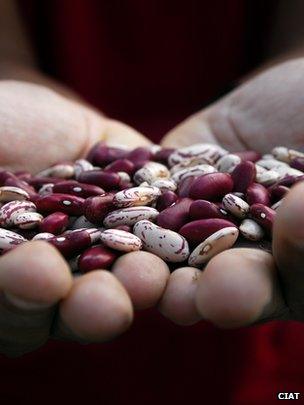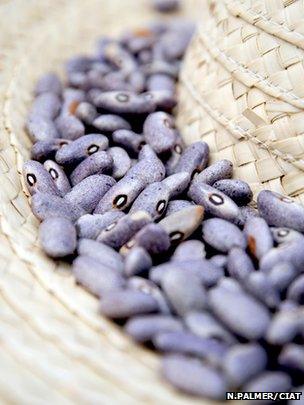
Hopes grow for climate-proof beans

A breakthrough in the development of temperature-resilient beans could help sustain a vital source of protein for millions of people around the globe.
The news offers a glimmer of hope for many farmers in developing nations.
Climate projections suggest that 50% of the countries' bean production will be lost by 2050 if farmers do not have access to the new variety of bean.
The discovery was made by plant breeders at CGIAR, a global agricultural research group.
One of the plant breeders involved in the research, Steve Beebe - a senior bean researcher at the International Center for Tropical Agriculture (CIAT) - explained that bean plants were, as a rule, very sensitive to excessive heat.
"Typically, beans are not grown in environments where the night temperature is above 18C (64F) or 19C," he told BBC News.
"Night temperatures are especially critical because the bean flower pollinates itself during night hours and the pollination process is very sensitive to temperature.
"When we talk about heat tolerance, we are especially concerned about the night-time temperatures."
Dr Beebe said the team wanted to see if there were varieties that displayed a trait of coping with night-time temperatures in the region of 23C.
"We gathered up the lines that we had in our breeding programme - lines that had been selected for other traits such as drought tolerance, which has been a high priority as well.
"We also pulled some lines off the shelf that were the result of a crossing programme about 12-15 years ago between our common bean and a tepary bean.
Vintage traits
He explained that the tepary bean was a neglected crop, grown by native Americans in the southwest US and Mexico in very hot and dry environments.

"We first started evaluating them for drought tolerance but when we decided to go into temperature evaluations, we selected these along with a much larger line of beans selected for drought or disease resistance," he recalled.
"We looked for varieties that were able to set pods and produce seeds in those conditions. We selected about 30 materials that were promising. That meant it was about 3% of our material that was of any interest at all.
"When we looked at what we had selected, the vast majority went back to the crosses that we had made 12-15 years ago."
Dr Beebe said the tepary bean as a food crop was not a popular cultivar.
"The grain type is very unusual, it is very small - only about half the size you are probably accustomed to. The plant type is not agronomically acceptable because it is very low growing and spreads," he said.
"But it has some very interest traits of heat tolerance and drought tolerance."
The beans, nicknamed heat-beaters, could help maintain a valuable source of protein and iron for almost half a billion people as the world warms, if researchers are able to get seeds to farmers.
Seeds of hope
A recent report by the The African Seed Access Index (TASAI) said millions of smallholder farmers were unable to access the wide range of crop seeds because they were too costly or simply not available from local seed sellers.
Dr Beebe explained: "Beans and other legumes are self-pollinating so they are not very attractive to private sector seed producers.
"What self-pollination implies is that the farmer can save their own seed year after year, so a seedsman in business thinks that they can sell seed once and then they will have no more market."
But he added that there had been several very innovative approaches to getting seed to smallholder farmers in this situation.
"One of the most successful has been selling seed but in very small packets.
"Seed is often marketed in sacks of 50lbs (23kg) or more and farmers cannot afford that. If you offer them a small packet that could be as little as 100g - they can buy that easily.
"It will only cover a very small area but for the farmer, she looks upon that favourably because it provides an opportunity for her to experiment with a new variety: does it grow well? Does it produce well? Does she like the grain? Does she like the taste? If she evaluates it favourably, she can either save her own seed or she can go back and buy a little more."
Dr Beebe said selling seeds in small packets also provided a way for new varieties to be more widely disseminated.
As for when farmers will be able to get their hands on the new "heat-beater" beans, he revealed: "As a matter of fact, if a farmer wrote to us today then we could - subject to certain restrictions - send them some."
He added: "But regarding when the seed is widely available to a massive number of farmers is subject to a process that has certain legal steps to it.
"To formally release a variety of crop, it must go through a series of tests, certified by the government, to validate a new variety. Then it needs to go through a seed production process.
"From now, these processes will take at least two years and in some countries, which have a longer process, it could even take four years."
No comments:
Post a Comment